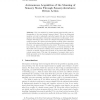Free Online Productivity Tools
i2Speak
i2Symbol
i2OCR
iTex2Img
iWeb2Print
iWeb2Shot
i2Type
iPdf2Split
iPdf2Merge
i2Bopomofo
i2Arabic
i2Style
i2Image
i2PDF
iLatex2Rtf
Sci2ools
BIOADIT
2004
Springer
2004
Springer
Autonomous Acquisition of the Meaning of Sensory States Through Sensory-Invariance Driven Action
Abstract. How can artificial or natural agents autonomously gain understanding of its own internal (sensory) state? This is an important question not just for physically embodied agents but also for software agents in the information technology environment. In this paper, we investigate this issue in the context of a simple biologically motivated sensorimotor agent. We observe and acknowledge, as many other researchers do, that action plays a key role in providing meaning to the sensory state. However, our approach differs from the others: We propose a new learning criterion, that of on-going maintenance of sensory invariance. We show that action sequence resulting from reinforcement learning of this criterion accurately portrays the property of the input that triggered a certain sensory state. This way, the meaning of a sensory state can be firmly grounded on the choreographed action which maintains invariance in the internal state.
BIOADIT 2004 | Certain Sensory State | Information Technology | Sensory Invariance | Sensory State |
| Added | 01 Jul 2010 |
| Updated | 01 Jul 2010 |
| Type | Conference |
| Year | 2004 |
| Where | BIOADIT |
| Authors | Yoonsuck Choe, S. Kumar Bhamidipati |
Comments (0)

